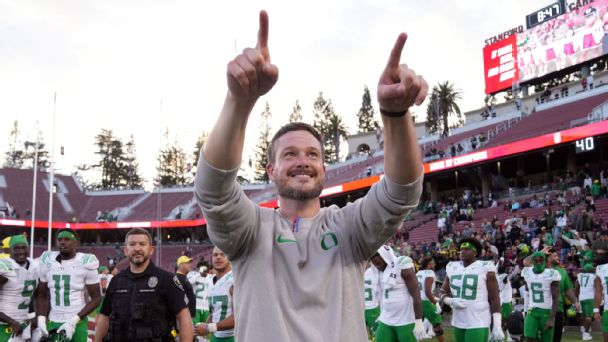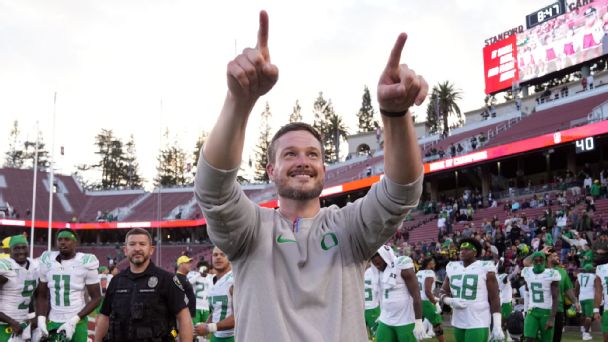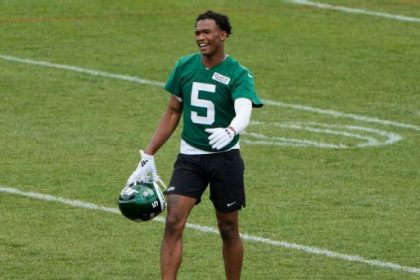
“DO PEOPLE THINK Oregon and think tough?”
An animated Dan Lanning stands in the front of the Oregon team room asking his entire team the rhetorical question. It’s the eighth week of the season and a 7-1 Ducks team is headed to Salt Lake City where it’ll face a Utah team that’s won 30 straight games at home and whose “national narrative,” as Lanning puts it, is one of being tough to beat.
“What’s the narrative on us?” Lanning continues. “Flashy.”
Oregon, with its Nike partnership, history of teams with offensive firepower and equally bold uniforms, has come to represent a certain kind of football, a certain kind of program, over the years. Whether you want to define it as flashy or otherwise, it’s no secret that effective marketing combined with success has turned the Ducks into a national brand. What that brand is exactly depends on who you ask.
“People don’t think you’re tough?” Lanning asks.
All you have to do is watch Lanning speak — sometimes yell — to realize he cuts against that very grain. And all you have to do is watch Oregon these past two seasons to realize that very same approach Lanning embodies has permeated throughout the program.
“He’s developed a culture of toughness,” offensive coordinator Will Stein told ESPN. “I mean his program’s built on toughness, mental and physical.”
It’s not that Lanning eschews flash, confidence or even, at times, arrogance, in place for the traditional idea of a buttoned-up college coach. In fact, the 37-year-old appears to embrace those outward displays of emotion and pride more than most. Just take a look at the speech he gave (and presumably allowed to be aired) during the Ducks’ commanding win over Colorado, where he said Oregon was a team “rooted in substance, not flash.” Since then, Oregon has arguably showcased both while backing it up with results.
Or how he gives the outside world glimpses, even if curated, of his coaching style and approach through cinematic recaps Oregon’s video department releases following every game this season.
Lanning stepped into the job in December 2021 and proceeded to give Oregon a new identity as it heads to the Big Ten next season by utilizing an approach that has resonated throughout the program.
“He’s a players’ coach,” wide receiver Tez Johnson said, referring to Lanning’s ethos to give players a voice, even in-game decision-making. “He’s the best coach in the country and anybody can come and argue with it, but he’s the best.”
Lanning isn’t without his young coaching mistakes, but two seasons in, he has Oregon playing like one of the best teams in the country, is a win over Washington away from a Pac-12 title and has a likely shot at the College Football Playoff.
“He’s got a relentless consistency,” quarterback Bo Nix said of Lanning. “I don’t think he has ever had a day where he’s been complacent.”
MARIANO RIVERA. “Top Gun: Maverick.” Martha and the Vandellas.
What do those three things have in common?
The answer is nothing. But somehow, all three have found their way into being a part of Oregon’s season thanks to Lanning.
Lanning, his players and fellow coaches say, is someone who lives and breathes football, while also constantly wanting to tether parts of the game to his real-life interests. A movie and music buff, it’s no surprise some of those pop cultural references make their way into team meetings and motivational material.
As their final regular-season cinematic recap showed last week, the theme was putting an emphasis on closing out games and seasons — something the Ducks did not do last season in Lanning’s first year.
It hasn’t been all sunshine and roses in Eugene for Lanning. His first game in Oregon colors was a 49-3 blowout at the hands of his former team. Later on that season, he found himself having to answer questions about his late-game management and decision-making multiple times, especially after a 3-point loss to Washington and a fourth-quarter letdown to their rival, Oregon State.
This year, there’s been a clear evolution despite some remaining growing pains. After a failed attempt at a fourth-and-3 near midfield with two minutes left against Washington, Oregon, which was up by 4 points at the time, eventually lost by 3, and Lanning took the blame.
“This game’s 100% on me,” Lanning said. “I don’t think you guys have to look anywhere else but me.”
Still, Lanning has done his best to use any failures to his team’s advantage and is likely going to do so again ahead of a rematch with the Huskies. In the lead-up to its rivalry game against the Beavers this season, the TVs around the team’s practice facility played last year’s fourth quarter against OSU — where Oregon allowed 21 points to cough up an 18-point lead — on a loop. In the eventual recap of the week on YouTube, shots showed images of billboards Oregon State had put up all season declaring it “Won in the Trenches” — images that were then printed out by Oregon and taped all over the team’s facility.
“They don’t have respect for you,” Lanning said. “We played three quarters last year. It’s time to play four quarters.”
Closing, then, was what Lanning wanted to harp on. So, of course, he brought up Rivera. He explained his prolific ability to deliver in high-stakes situations and secure wins late in games. That was his job; now it was Oregon’s job to ensure it wouldn’t repeat last year’s letdown to Oregon State and close out its season with a win.
But the comparison didn’t stop there. Lanning showed a video of Rivera walking out to “Enter Sandman” — the longtime Yankees closer’s patented walkout song — and said the Ducks would have their own closer’s song too: “Nowhere to Run” by Martha and the Vandellas.
“‘Nowhere to run, nowhere to hide,'” Lanning said. “In the fourth quarter, when you hear this, you’ll know what time it is,”
Sure enough, with Oregon up 24-7 on OSU last Friday night heading into the fourth quarter and on its way to a 31-7 win, the Autzen Stadium speakers began to blare a now-familiar tune.
Nowhere to run to, baby (nowhere to run, nowhere to hide)
Nowhere to hide (ooh-ooh-ooh)
Got nowhere to run to, baby (nowhere to run, nowhere to hide)
Nowhere to hide (ooh-ooh-ooh)
Somehow, through pop-culture references and his own version of coach-speak, Lanning comes off less like the older guy trying to remain cool and more like the younger coach who believes being the most authentic version of himself will make him the best possible leader.
“He’s still got that young personality and still enjoys other things outside of football,” Nix said. “I think sometimes we see head coaches as strictly football, but he’s still a young coach in this profession and he still enjoys other things outside of football and X’s O’s. He’s knowledgeable about a bunch of things that us players are knowledgeable about, so he can kind of connect with us that way.”
Take the unofficial slogan of this Ducks team, for example, which has made its way onto T-shirts that Lanning has worn multiple times.
“FEBU”
There’s some debate among Oregon fans as to what the “F” exactly stands for, but the rest stands for “Everybody But Us.” You can connect the dots.
STEIN’S NEWBORN SON was not yet a full month old when the former co-offensive coordinator and quarterbacks coach at UTSA, got a call from Lanning.
“Do you want to be a Duck?”
Stein didn’t think twice. This was an opportunity he didn’t want to pass up.
Once Stein arrived in Eugene, it didn’t take long for him to see what kind of program Lanning was building. The word that came to mind, one that Lanning and Oregon players mention repeatedly when asked what has made this team succeed, is “connected.”
“I’ve never seen a more connected team,” Lanning said after the win over Oregon State. “I’ve never been around a team that is anxious to grow and learn even from wins. Talk about being a tough team and there are moments last year when I felt like these guys needed to bang at practice and we probably weren’t as excited to bang at practice. Now I put them in spiders one day and they ask why we aren’t in shoulder pads, and I think that speaks to their toughness.”
And whether it’s through his motivational speeches or how he’s established a curriculum of offseason “get real” sessions that push players to discuss topics and goals outside of football, everyone from Nix to Stein to wide receiver Troy Franklin credit Lanning for establishing said connection.
“Dan’s an innovator,” Stein said. “He’s got a lot of swag and a lot of confidence and it’s due to his preparation.”
Lanning’s self-assuredness has always been part of his coaching journey. His own backstory includes a 13-hour drive from Missouri, where he was a high school special teams/defensive backs/wide receivers coach, to Pittsburgh just to create an opportunity for himself. He had heard about a potential opening at Pitt and, though he hadn’t heard back despite sending countless emails to the staff, Lanning decided to make sure he had every chance to secure what was eventually a defensive quality control position by going the extra mile. Or the extra 710 miles.
Since then, Lanning has held every position from graduate assistant to recruiting coordinator to defensive backs coach, linebackers coach and defensive coordinator at Power 5 programs like Alabama, Georgia, Memphis and Arizona State. It’s all prepared him for the job he’s doing now, which Stein aptly describes as the CEO of the program.
“The way that he oversees the entire program and that he has his hands on everything when it comes to facilities, when it comes to NIL, when it comes to offense, defense, special teams, I mean, he’s involved in every little detail,” Stein said. “But he also empowers all of us coaches to be innovative and to step outside the box and to keep growing and he encourages that, so he’s been really easy to work for.”
It goes beyond bulletin board material or catchy slogans. Lanning’s approach runs throughout his staff, which leans heavily on younger individuals, too. Both of Lanning’s top assistants are in their 30s and no coach on staff is older than 50.
Perhaps it’s his age, or his experience having had many jobs in the sport, but Lanning appears to be keenly aware of where, when and how he needs help as a head coach. Coming from Georgia, where his focus was defense, there were questions about how the Ducks’ offense would take shape under his tenure. In the Pac-12, with its talented quarterbacks and high-scoring offenses, a strong offensive system and a prolific quarterback are prerequisites to succeed. So, Lanning first brought then-Florida State offensive coordinator Kenny Dillingham and his former quarterback at Auburn Nix on board. Under Lanning, the two reignited Nix’s career, then Stein continued the work once Dillingham left to be the head coach at Arizona State. The Oregon offense hasn’t missed a beat; it’s the top-ranked unit in the nation.
For as much as Oregon’s brand has been about offense in the past, it has not been a one-dimensional team. In fact, according to ESPN’s SP+ rankings, only Georgia, Michigan and Florida State have a combined offense-defense ranking that’s better than the Ducks.
Yet despite the dominant wins as of late and the impressive numbers across the board, Washington still looms. Lanning is 0-2 against the Huskies so far, with both results separated by only a field goal. One more loss and it’ll start to feel like Kalen DeBoer’s team is the first-time head coach’s kryptonite. And, as Stein and Nix will emphasize, Lanning hates losing.
“He’s one of the more competitive human beings I’ve ever been around in my entire life,” Stein said. “I’ve golfed with Dan multiple times. He might not be the best, but he wants to win. You play cornhole with him, shoot basketball, whatever it is. He’s a guy that wants to win.”
Whether or not Oregon overcomes its Washington hump and advances into the College Football Playoff, Lanning is determined to continue building — using everything in his power to combine toughness with plenty of flash and confidence, as Oregon transitions to the Big Ten not wanting to give up any of its success and momentum in the process.
But for now, the future can wait. Said Lanning last Friday, “We still have some unfinished business.”










